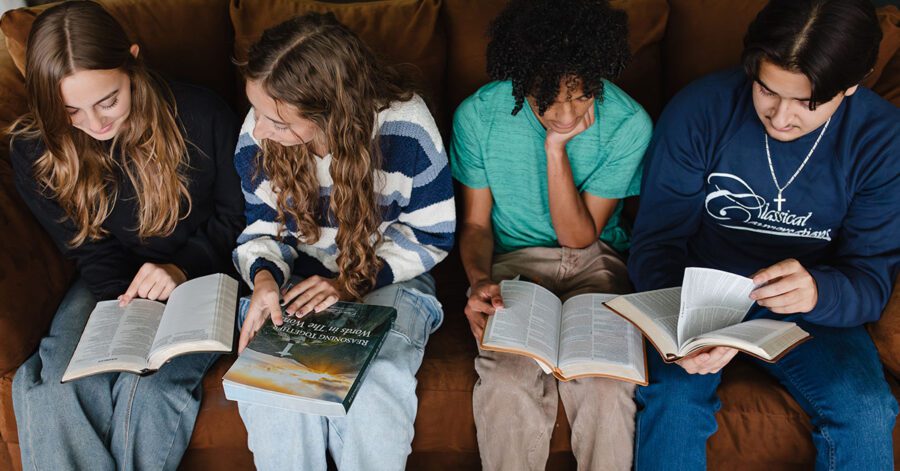One of the obvious, but often overlooked, fundamentals of homeschooling is that once you decide to homeschool, you become a teacher. Most of us begin by thinking that in order to give our children the best education we need to buy the best curricula. However, in all your years of education, did you ever think to yourself, “I love biology because of that great curriculum!” or “I love writing because of that great writing guide!” Chances are, we were never even aware of a curriculum. We loved a subject because of a teacher who inspired us. Chances are, it was a teacher who really loved the subject, brought it to life, and included you in his or her excitement. Also, the teacher may have really liked you, but that part is easy to replicate at home—we already like our students. One might say we love them enough to give our lives for them. In deciding to homeschool you’ve already done that part.
Today, I want to challenge you to change your thinking slightly. Choosing a good curriculum is important, but it’s only a small step.* The big step is to become the very best teacher you can be.

I am most inspired to become a better teacher by the book, Laddie, by Gene Stratton-Porter. I bought this book because it was recommended as one of the first books to read in A Thomas Jefferson Education. I wish I had known about this book when I was a younger, so I could have loved it longer. Laddie is the beloved grown-up brother of the narrator of the story, a girl who is about nine years old. The girl says at one point about her teacher:
“Miss Amelia offered to hear me [recite my lessons] but I just begged Laddie, and father could see that he taught me fifty things in a lesson that you could tell to look at Miss Amelia, she never knew. Why, he couldn’t hear me read:
“We charged upon a flock of geese,
And put them all to flight
Except one sturdy gander
That thought to show us fight,”
without teaching me that the oldest picture in all the world was made of a row of geese, some of which were kinds we then had—the earth didn’t seem so old when you thought of that—and how a flock of geese once wakened an army and saved a city, and how far wild geese could fly without alighting in migration, and everything you could think of about geese, only he didn’t know why eating the same grass made feathers on geese and wool on sheep. Anyway, Miss Amelia never told you a word but what was in the book, and how to read and spell it.”
Oh, how I long to teach as Laddie did, and not to be like Miss Amelia! I’d love to bring each lesson to life by telling fifty more interesting things about every subject.
Classical Conversations has enabled me to become more like Laddie by providing the framework of subjects to which I can add fifty things. In my first few years of homeschooling with Classical Conversations, I brought very little to a lesson, but with the support of tutors and directors, a lot of reading aloud, and reading at night after the kids went to bed, I’ve managed to learn maybe fifty extra things about a few subjects. Although it has taken several years, I now can bring a timeline card, or a science snippet, or a site on a map to life, just as Laddie did.
Classical Conversations brings tutors to my children who light up subjects for them, too. My daughter is enrolled in Challenge A with a delightful woman who used to be an accountant—I expect her warmth and kindness and her love of math will be quite the complement to my Miss Amelia-like way with math! My son has been able to spend a year with a Challenge B tutor who is passionate about politics, a subject in which I am just a beginner. I’ve met several pastors who are tutors and I’d love to be one of their students and hear the things they add to a lesson!
Another benefit of being a part of Classical Conversations is the opportunity to learn from the experiences of others. Every group brings together families with different experiences and often a group will have several moms who are a few grades ahead and I can seek their advice. I also take the advice of Leigh Bortins, since she has gone before me, tried it out, and come back to share what she learned. It’s like “standing on the shoulders of giants.” We are able to go further and do more if we can learn from their mistakes and successes.
Classical Conversations has also helped me become a better teacher through CC’s summer trainings (practicums). These events are unique. They go deep. They make me think. Topics such as, “how to get your toddler to behave during school-time,” or “how to plan your homeschool day,” are covered quite well in state homeschool conventions, so CC doesn’t set out to do that. They get right to the heart of a Classical education and talk about what it really means, what our end-goals should be, and how we can give our children a far better education than we had.
Because Classical Conversations has taught me the principles and goals of classical education, I’m free to flesh it out as I think best for my children according to how God made them. I am not locked into a pre-planned curriculum guide. If I know the goal and the purposes behind each subject, I know what to emphasize and what skill is worth spending extra time on, or perhaps what items we can master quickly and move on from. You might say the practicum helps me see the forest so I don’t get tangled in the trees.
This year, my goal is to learn more, which I expect will help me become a better teacher…a little more like Laddie, a little less like Miss Amelia…and help me bring lessons to life and enjoy learning with my children.
_________________________________
*I recommend following Classical Conversations’ advice about curricula, as you might have guessed. Sometimes I don’t see the wisdom in something at first, but if I trust the program I discover the wisdom as I progress.
Originally Posted by Courtney Sanford on Thursday, 28 April, 2011. Lightly updated for 2020.



